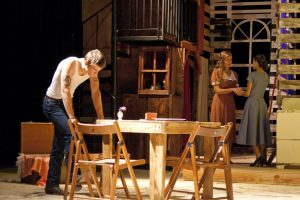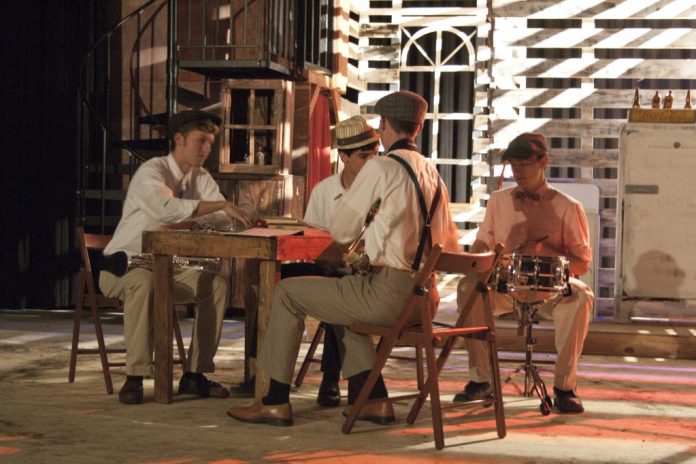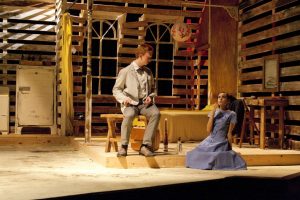Often times, a serious social justice issue can be hard to explain to the young, developing minds of teenage boys. Jesuit Theater, in conjunction with the Diversity Department did explain a number of serious social issues with their performance of the melancholy play “A Streetcar Named Desire.” Their portrayal of these issues successfully enthralled the minds of the Jesuit community.
 The theater program, featuring girls from Ursuline Academy, Booker T. Washington Performing Arts Magnet, W.T. White, and Hockaday, performed their rendition of “Streetcar” on November 10, 11, 18, and 19, 2011, in the Lecture Hall. The set, designed by Theater Director David Myers and constructed by a fairly new Stagecraft class, was one of the most elaborate sets built at Jesuit.
The theater program, featuring girls from Ursuline Academy, Booker T. Washington Performing Arts Magnet, W.T. White, and Hockaday, performed their rendition of “Streetcar” on November 10, 11, 18, and 19, 2011, in the Lecture Hall. The set, designed by Theater Director David Myers and constructed by a fairly new Stagecraft class, was one of the most elaborate sets built at Jesuit.
“A Streetcar Named Desire” is a dark play that explores gender discrimination, alcoholism, and domestic violence. The play, set in New Orleans, Louisiana, begins with the arrival of a southern woman named Blanche who comes to the home of her sister, Stella, in an attempt to escape her previous life as a mentally unstable alcoholic. Stella, though, has problems of her own: she is married to the brutish Stanley Kowalski, a man who often drinks and abuses his wife.
Stella, despite the abuse, is attracted to Stanley’s power and animalistic sexuality, which forms the foundation of their relationship. Blanche disagrees with Stella’s decision to brush off the abuse and makes her disgust plain to both Stella and Stanley, causing a conflict in their relationship. This infuriates Stanley, leading him to confront Blanche about her past in an attempt to unmask her true identity.
These confrontations are predictably violent and finally climax with a sexual assault that leads to Blanche’s nervous breakdown. She is admitted to a mental institution at the end of the play.
Directors David Myers, Patricia Watson and Kate Knapek cast the crew of extremely talented actors. The play was dually cast, meaning there were two different actors that played a single role on individual nights. Noah Barron ’12 and Eric Bradley ’13 masterfully played the role of Stanley on alternating nights, while Stella was convincingly portrayed by Mary Frances Harris, a Hockaday senior, and Macy Hernandez, a W.T. White senior. Blanche was portrayed beautifully by Ursuline’s Adrian Collins and Haleyna Kociuk-Garza.
I had the pleasure of seeing the “Cast A” performance, with Noah, Adrian, and Mary Frances taking the main roles. These insanely talented individuals struck nerves in the audience during the performance, evidently fully captivating the viewers’ attention. Tears were shed in the audience when Stanley violently beat his wife in one scene. “It definitely wasn’t the easiest thing I’ve done,” Barron said of his portrayal of Stanley. “It took a lot of time and practice for me to be able to become a character as dark as Stanley.”
All four nights produced a great turnout, filling the Lecture Hall with almost 300 people each night. The next Jesuit Theater event will be the senior-directed One Acts in January. The performance features nine short comedies written by various senior directors, including Connor Beach ’12. If the reader is looking for a good laugh, he need not look farther than the January One Acts.
Photography by Mr. DiLorenzo







